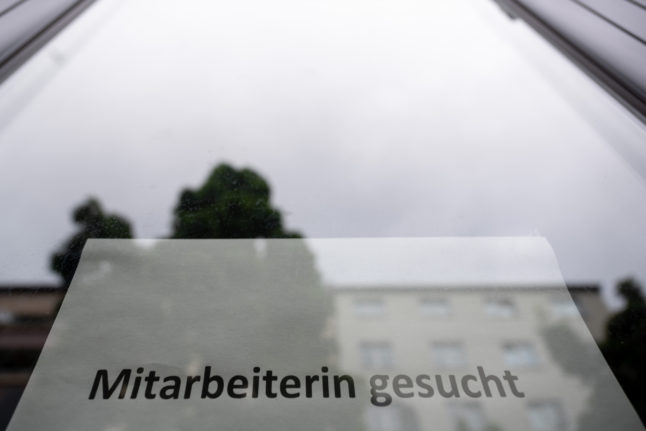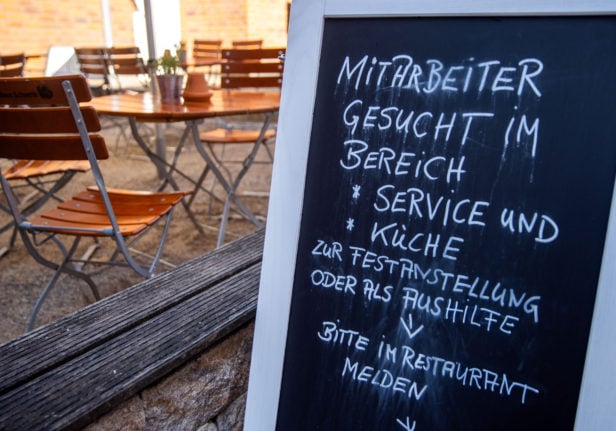In the first quarter of this year, the shortage of skilled workers in Germany reached record levels.
In March the number of vacancies rose to a new high of 558,000, said the Competence Centre for Securing Skilled Labour (KOFA) last month.
It means that the skilled labour gap widened by 88,000 vacancies within just three months.
As The Local has been reporting, Germany has been trying to plug its worker gap. In 2020 the government eased some immigration laws to help attract workers – and the new government plans to go even further.
READ ALSO: What Germany’s plans for a points-based immigration system means for foreigners
In order to deal with labour shortages, Germany needs around 400,000 new workers every year, according to the Federal Employment Agency.
Job vacancies across the board
According to the recent study by KOFA, the growing shortage of skilled workers is affecting the entire labour market.
However, the shortages are particularly large in the health, social services, teaching and education sectors, as well as in the construction, architecture, engineering, surveying, and building services.

READ ALSO: 10 things you need to know about Germany’s law to attract skilled foreign workers
In the areas of health, social services, teaching and education alone, around six out of 10 jobs are unfilled.
There are also above average vacancies in the fields of raw material extraction, production and manufacturing, natural sciences, geography and IT, as well as agriculture, forestry and horticulture.
The number of vacancies for qualified applicants in aviation and energy technology occupations has also increased sharply recently.
Another study – the KfW-ifo Skilled Workers Barometer May 2022 – also said economic sectors are affected by shortages, including legal and tax advisors plus auditors.
“The shortage of skilled workers has again become a growing challenge for Germany’s future,” said the KFW research.
“A large proportion of companies are affected. Tensions in international trade relations and disruptions in supply chains will continue to put pressure on the export economy, on which about a quarter of all jobs in Germany depend.
EXPLAINED: The 25 most in-demand jobs in Germany
“At the same time, the shortage of skilled workers in important sectors of the economy such as the skilled trades or health care is expected to worsen due to demographic change. And digitalisation will have a major influence on which skills will be in demand in the future.”
Festivals call for staff
Other industries are also affected by staff shortages. Festival organisers as well as restaurant, cafe and bar managers in Germany are struggling to fill positions.
Part of the problem was that lockdowns and closures saw hospitality staff endure months of Kurzarbeit (reduced working hours) in 2020 and 2021. By the time the bars, cafes and restaurants reopened, many had found work in different sectors or were reluctant to return to them.
Long hours, anti-social times of work, unstable contracts and lower pay also generally make the hospitality sector less attractive to potential employees.
Some festivals in Germany are even having to beg for workers this summer.
At the end of April, the organisers of the “Umsonst & Draußen” festival in Würzburg made a dramatic appeal to the public – they called for 300 workers to help put the festival on.
Organiser Ralf Duggen said that students, who usually take summer jobs, were not coming forward to work after two years of cancelled festivals.
READ ALSO: Working in Germany – 7 factors that can affect how much you’re paid
Vocabulary
Skilled workers – (die) Fachkräfte
Vacancies – (die) offenen Stellen
Skilled labour gap – (die) Fachkräftelücke
Above average – überdurchschnittlich
We’re aiming to help our readers improve their German by translating vocabulary from some of our news stories. Did you find this article useful? Let us know.




 Please whitelist us to continue reading.
Please whitelist us to continue reading.
As an EU-educated midwife with a BSc and MSc (so much more highly qualified than the German apprenticeship program), I cannot work here until I have a B2 German certificate. But recent refugees from the Ukraine, who are not EU educated (i.e. the regulated EU-wide curriculum for registered nurses and midwives) can work right away without a word of German. I fully support this initiative and think it’s great, but surely other skilled workers should have the same rights? In my home country we had Polish nurses coming to us with hardly any English and within a few months of working in an English-speaking environment, they were fluent. I have no doubt the same would be true here for me, but I am not afforded the opportunity while the nation laments about the lack of nurses and midwives. Hmmm.